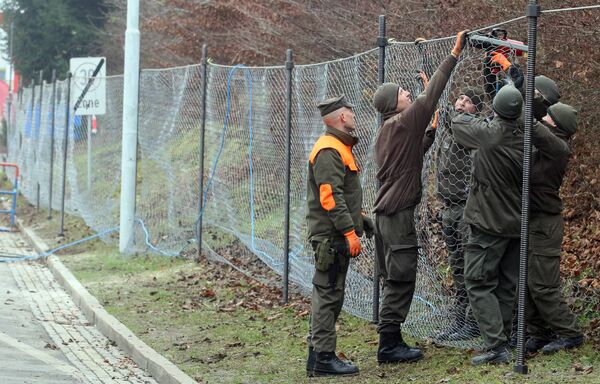November 9, 1989, the date of the beginning of the fall of the Berlin Wall, is seen as a momentous date not only in German, but world history.
The Wall's collapse has been seen as the turning point in the unification of Germany, and for many the joyous images of that evening symbolize the benefits of open borders and globalization.
November 9, 1989 = Date Berlin wall came down.
— Brandon Jozsa (@v1k0d3n) November 9, 2016
November 9, 2016 = Date Trump will make plans to build US/Mexico wall.
What a step back…
However on the morning of November 9, 2016, there was talk of a different wall, with many waking to the news that Republican candidate Donald Trump had been elected US president on the back of his campaign, which pledged — among other things — to build a wall between the US and Mexico.
Europe Closing It's Borders
While Trump's proposal to build a physical wall — which he hopes Mexico will pay for — along the US' 3,200 kilometre border with its southern neighbor has been derided as unrealistic and unnecessary by critics, the sentiment reflects a growing willingness to close borders around the world.
Trump's wall plan to keep illegal immigrants from entering the US echoes the actions of the Hungarian government, with Budapest last year building a 523 kilometer, four meter high razor fence along its border with Serbia and Croatia, aimed at preventing migrants and refugees fleeing the Middle East from coming to Hungary.
Hungary to build second border fence to stop refugees: Prime Ministers confirms plans of adding to the 500km razor-wire fence Hungary…
— ThompsonBarreto (@ThompsonBarreto) August 26, 2016
To a lesser extent, the strains of the migration crisis also forced the hands of some other EU countries, with several member states reintroducing border controls as part of their efforts to manage the flow of people entering the continent.
This culminated in the Austrian government severely restricting the number of people allowed to enter the country on a daily level, leading to a domino effect of Balkan countries who closed their borders, leaving many migrants and refugees stranded in Greece.

The actions of these countries raised concerns about an open Europe, and posed questions about the sustainability of the EU's much-touted passport-free Schengen travel zone.
Brexit and Ireland
These immigration concerns and fears about the ability of EU countries to control their own borders featured heavily in the UK's June 23 decision to vote to leave the EU, interpreted by Leave campaigners as a chance to "take back control" of Britain.
The UK's eventual Brexit from the union has since raised concerns about the potential reintroduction of a hard border between the Northern Ireland and the southern Republic.
Will Brexit make Dundalk the new Calais? Expensive unenforceable hard Brexit border a new headache for Ireland
— Paul Flynn (@PaulFlynnMP) October 27, 2016
And while politicians on both sides remain committed to avoiding such a fate, it is another piece of evidence behind the growing trend of walls and barriers being established.
Walls Against Free Trade
The proliferation of walls isn't just restricted to physical structures, either.
Concerns about the increased spread of inequality in Western society has led to an anti-globalization backlash, with many activists, governments and political parties protesting against international free trade deals such as TTIP, TPP and CETA.
One advantage…he seems to be anti TTIP #alwaysasilverlining
— Kris Clark (@maxenpuck) November 9, 2016
Now with Trump in the White House, some analysts say that TTIP and the TPP are as good as dead, while the CETA deal between the EU and Canada was only passed at the last minute following protestations from the Belgian region of Wallonia, who were concerned about the impact such a deal would have only local farmers.
So while November 9 will still be celebrated as a pivotal day in reducing barriers and bringing people together, Trump's election and plans to build a wall with Mexico will give the date new meaning, amid a growing worldwide trend.


